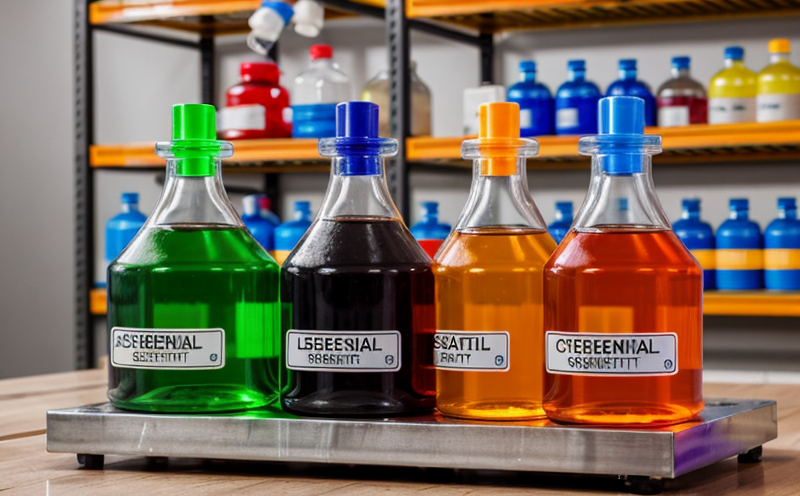Methanol Content Testing in Consumer Goods
The testing of methanol content in consumer goods is critical to ensure product safety and compliance with regulatory standards. Methanol, a common solvent used in various household products, can pose significant health risks if present at unsafe levels. This service involves the analysis of methanol content using precise laboratory techniques to meet stringent quality control requirements.
Consumer goods encompass a wide range of items from personal care products like shampoos and lotions to electronics and toys. Methanol testing ensures that these products do not contain harmful concentrations of methanol, which can lead to health issues such as nausea, dizziness, or even more severe poisoning in high doses.
Our laboratory adheres to international standards such as ISO 17025 for method validation and compliance with local regulations like EU REACH. This ensures that the test results are accurate and reliable, providing peace of mind to manufacturers and retailers alike.
The testing process typically involves the collection of samples from the consumer goods under scrutiny. These samples undergo rigorous analysis using advanced instruments such as gas chromatography (GC) or liquid chromatography (LC). The method for determining methanol content is based on established guidelines, ensuring consistency and accuracy in results.
- Sample Collection: Samples are collected from various consumer goods to ensure a representative sample set.
- Instrumentation: Advanced instruments such as GC or LC are used for precise analysis.
- Reporting: Comprehensive reports are generated detailing the methanol content and compliance with standards.
The testing process is designed to provide accurate, reliable data that can be used by manufacturers to ensure their products meet safety standards. This service supports quality management teams in maintaining high product standards and protects consumers from potential harm.
| Sample Type | Acceptance Criteria (ppm) | Testing Method | Regulatory Compliance |
|---|---|---|---|
| Personal care products | <100 ppm | Gas Chromatography (GC) | EU REACH |
| Electronics | <50 ppm | Liquid Chromatography (LC) | RoHS Directive |
| Toys and children's products | <100 ppm | GC | ASTM F963 |
The precision of our testing methods ensures that even the smallest trace of methanol is detectable, providing a comprehensive evaluation of the product's safety. This service not only helps in meeting regulatory requirements but also aids in protecting consumer health.
Benefits
- Enhanced Product Safety: Ensures that methanol levels are within safe limits, protecting consumers from potential harm.
- Regulatory Compliance: Helps manufacturers comply with local and international regulations such as EU REACH and RoHS Directive.
- Quality Assurance: Provides a robust testing process that supports ongoing quality control efforts.
- Market Access: Ensures products meet the requirements for entering various markets, thereby enhancing marketability.
The methanol content testing service is essential for manufacturers and retailers aiming to maintain high standards of product safety. By ensuring compliance with regulatory standards, this service helps build consumer trust and confidence in the brands they choose.
Eurolab Advantages
At Eurolab, we pride ourselves on offering a comprehensive range of services to support our clients' needs. Our expertise and state-of-the-art facilities ensure that every test is conducted with precision and reliability.
- Accreditation: Eurolab is ISO 17025 accredited, ensuring the highest standards in method validation.
- Experienced Staff: Our team of experts has extensive experience in chemical testing and analysis.
- Advanced Equipment: We use cutting-edge instruments to provide accurate test results.
- Compliance: Eurolab ensures that all tests meet the latest regulatory requirements.
We are committed to providing our clients with reliable, accurate, and timely testing services. Our goal is to help manufacturers and retailers create safe, compliant products that can be trusted by consumers worldwide.
Use Cases and Application Examples
- Personal Care Products: Testing for methanol in shampoos and lotions ensures they are safe for use.
- Electronics: Ensuring that methanol content is below the acceptable limit prevents potential damage to sensitive components.
- Toys and Children's Products: Methanol testing helps maintain safety standards, especially important given children’s frequent contact with such items.
The following table provides specific use cases for methanol content testing in various consumer goods:
| Product Type | Purpose of Testing | Expected Outcome |
|---|---|---|
| Personal care products | Detecting methanol to ensure safety for use. | Absence or acceptable levels of methanol in the product. |
| Electronics | Ensuring methanol does not affect performance and longevity. | Maintenance of product functionality without methanol-related issues. |
| Toys and children's products | Guaranteeing safety for child use. | Confirmation that the product is safe for handling by children. |
Methanol content testing is crucial in ensuring consumer goods meet strict safety standards, protecting users from potential health hazards and legal repercussions. Our comprehensive testing service supports quality management teams in maintaining high product standards and enhancing consumer trust.





